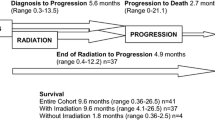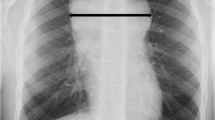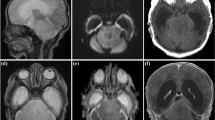Abstract
Purpose and methods
Patients with brain metastases present severe symptoms owing to the tumor growth or treatment side effects, and supportive measures are often critical for the patients and their families. However, there is currently a lack of palliative care and end-of-life (EoL) provision for patients affected by advanced brain tumors. We performed a retrospective analysis of the characteristics of patients with brain metastases from lung cancer between August 1998 and December 2008 in our palliative care center.
Results
During this period, 55 such patients died. The male/female ratio was 0.86, and the mean age was 60.7 years. The duration of the last stay before death varied between 2 and 196 days (mean, 42.6 days). Death appeared predictable as the consequence of end-stage disease in all cases. The most frequent general clinical complaints were pain (64.8%), general fatigue (46.2%), and dyspnea (31.4%). The most frequent symptoms related to the brain tumors were consciousness deterioration (33%), headache (26%), cranial nerve palsy (19%), and delirium (19%). The symptoms in patients with carcinomatous meningitis were headache (63.6%), cranial nerve palsy (45.4%), epilepsy (27.2%), and nausea and vomiting (27.2%). The therapy tools used were chemotherapy in 9% and steroids and glycerol in 32.7%. Four patients who had leptomeningeal carcinomatosis suffered from hydrocephalus, and treatments for vasogenic edema or antalgics were less effective. In such cases, cerebrospinal fluid drainage may be effective if there are no space-occupying lesions. One patient had cortical atrophy with cognitive impairment and another had a cerebral infarction during admission.
Conclusion
Optimization of the quality of life in its final stages requires efficient palliative care, which involves considerable psychological, sociological, technical, and financial burdens. Palliative management of brain metastases requires a multidisciplinary approach performed by a well-trained neuro-oncology team, and it is important to avoid any treatment that is harmful or has a poor toxicity/efficacy ratio to avoid inappropriate prolongation of dying.


Similar content being viewed by others
References
Kristensen CA, Kristjansen PE, Hansen HH (1992) Systemic chemotherapy of brain metastases from small-cell lung cancer: a review. J Clin Oncol 10(9):1498–1502
Wen PY, McLaren Black P, Loeffler JS (1999) Metastatic brain cancer. In: De Vita VT Jr, Hellman S, Rosenberg SA (eds) Cancer: principles and practice of oncology, 6th edn. Lippincott Williams & Wilkins, Philadelphia, pp 2655–2670
Lagerwaard FJ, Levendag PC, Nowak PJCM et al (1999) Identification of prognostic factors in patients with brain metastases: a review of 1292 patients. Int J Radiat Oncol Biol Phys 43:795–803
Sheenan JP, Sun MH, Kondziolka D et al (2002) Radiosurgery for non-small cell lung carcinoma metastatic to the brain: long-term outcomes and prognostic factors influencing patient survival time and local tumor control. J Neurosurg 97:1276–1281
Stewart DJ, Leavens M, Maor M et al (1982) Human central nervous system distribution of cis-diamminedichloroplatinum and use as a radiosensitizer in malignant brain tumors. Cancer Res 42(6):2474–2479
Patchell RA, Tibbs PA, Walsh JW et al (1990) A randomized trial of surgery in the treatment of single metastases to the brain. N Engl J Med 322(8):494–500
Kihlström L, Karlsson B, Lindquist C (1993) Gamma Knife surgery for cerebral metastases. Implications for survival based on 16 years experience. Stereotact Funct Neurosurg 61(Suppl 1):45–50
Horton J, Baxter DH, Olson KB (1971) The management of metastases to the brain by irradiation and corticosteroids. Am J Roentgenol Radium Ther Nucl Med 111(2):334–336
Fukuoka S, Seo Y, Takanashi M et al (1996) Radiosurgery of brain metastases with the Gamma Knife. Stereotact Funct Neurosurg 66(Suppl 1):193–200
Siegers HP (1990) Chemotherapy for brain metastases: recent developments and clinical considerations. Cancer Treat Rev 17(1):63–76
Taillibert S, Delattre JY (2005) Palliative care in patients with brain metastases. Curr Opin Oncol 17(6):588–592
Pace A, Di Lorenzo C, Guariglia L et al (2009) End of life issues in brain tumor patients. J Neurooncol 91(1):39–43
Maruyama C (1971) Treatment of malignant tumors by an extract from tubercle bacilli (tuberculosis vaccine). Nippon Ika Daigaku Zasshi 38(5):267–276
Rusch V, Baselga J, Cordon-Cardo C et al (1993) Differential expression of the epidermal growth factor receptor and its ligands in primary non-small cell lung cancers and adjacent benign lung. Cancer Res 53:2379–2385
Volm M, Rittgen W, Drings P (1998) Prognostic value of ERBB-1, VEGF, cyclin A, FOS, JUN and MYC in patients with squamous cell lung carcinomas. Br J Cancer 77:663–669
Lawrence DS, Niu J (1998) Protein kinase inhibitors: the tyrosine-specific protein kinases. Pharmacol Ther 77:81–114
Chiu CH, Tsai CM, Chen YM et al (2005) Gefitinib is active in patients with brain metastases from non-small cell lung cancer and response is related to skin toxicity. Lung Cancer 47(1):129–138
Wu C, Li YL, Wang ZM et al (2007) Gefitinib as palliative therapy for lung adenocarcinoma metastatic to the brain. Lung Cancer 57(3):359–364
Ceresoli GL, Cappuzzo F, Gregorc V et al (2004) Gefitinib in patients with brain metastases from non-small-cell lung cancer: a prospective trial. Ann Oncol 15:1042–1047
Yokouchi H, Yamazaki K, Kinoshita I et al (2007) Clinical benefit of readministration of gefitinib for initial gefitinib-responders with non-small cell lung cancer. BMC Cancer 7:51
Sakai M, Ishikawa S, Ito H et al (2006) Carcinomatous meningitis from non-small-cell lung cancer responding to gefitinib. Int J Clin Oncol 11(3):243–245
Kim MK, Lee KH, Lee JK et al (2005) Gefitinib is also active for carcinomatous meningitis in NSCLC. Lung Cancer 50(2):265–269
Lai CS, Boshoff C, Falzon M, Lee SM (2006) Complete response to erlotinib treatment in brain metastases from recurrent NSCLC. Thorax 61(1):91
Popat S, Hughes S, Papadopoulos P et al (2007) Recurrent responses to non-small cell lung cancer brain metastases with erlotinib. Lung Cancer 56(1):135–137
Chang JW, Chou CL, Huang SF et al (2007) Erlotinib response of EGFR-mutant gefitinib-resistant non-small-cell lung cancer. Lung Cancer 58(3):414–417
Gounant V, Wislez M, Poulot V et al (2007) Subsequent brain metastasis responses to epidermal growth factor receptor tyrosine kinase inhibitors in a patient with non-small-cell lung cancer. Lung Cancer 58(3):425–428
Fekrazad MH, Ravindranathan M, Jones DV Jr (2007) Response of intracranial metastases to erlotinib therapy. J Clin Oncol 25(31):5024–5026
von Pawel J, Wagner H, Duell T, Poellinger B (2008) Erlotinib in patients with previously irradiated, recurrent brain metastases from non-small cell lung cancer: two case reports. Onkologie 31(3):123–126
Altavilla G, Arrigo C, Santarpia MC et al (2008) Erlotinib therapy in a patient with non-small-cell lung cancer and brain metastases. J Neurooncol 90(1):31–33
Ruppert AM, Beau-Faller M, Neuville A et al (2009) EGFR-TKI and lung adenocarcinoma with CNS relapse: interest of molecular follow-up. Eur Respir J 33(2):436–440
Baker SD, Wirth M, Statkevich P et al (1999) Absorption, metabolism and excretion of 14C-temozolomide following oral administration to patients with advanced cancer. Clin Cancer Res 5:309–317
Ostermann S, Csajka C, Buclin T et al (2004) Plasma and cerebrospinal fluid population pharmacokinetics of temozolomide in malignant glioma patients. Clin Cancer Res 10:3728–3736
Giorgio CG, Giuffrida D, Pappalardo A et al (2005) Oral temozolomide in heavily pre-treated brain metastases from non-small cell lung cancer: phase II study. Lung Cancer 50(2):247–254
Kouroussis C, Vamvakas L, Vardakis N et al (2009) Continuous administration of daily low-dose temozolomide in pretreated patients with advanced non-small cell lung cancer: a phase II study. Oncology 76(2):112–117
Abrey LE, Olson JD, Raizer JJ et al (2001) A phase II trial of TMZ for patients with recurrent or progressive brain metastases. J Neurooncol 53:259–265
Christodoulou C, Bafaloukos D, Kosmidis P et al (2001) Phase II study of temozolomide in heavily pretreated cancer patients with brain metastases. Ann Oncol 12:249–254
Davies E, Higginson IJ (2003) Communication, information and support for adults with malignant cerebral glioma: a systematic literature review. Support Care Cancer 11(1):21–29
Author information
Authors and Affiliations
Corresponding author
Rights and permissions
About this article
Cite this article
Yamanaka, R., Koga, H., Yamamoto, Y. et al. Characteristics of patients with brain metastases from lung cancer in a palliative care center. Support Care Cancer 19, 467–473 (2011). https://doi.org/10.1007/s00520-010-0838-5
Received:
Accepted:
Published:
Issue Date:
DOI: https://doi.org/10.1007/s00520-010-0838-5




